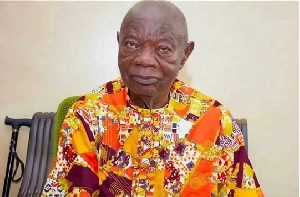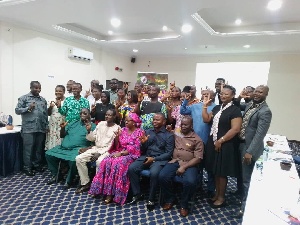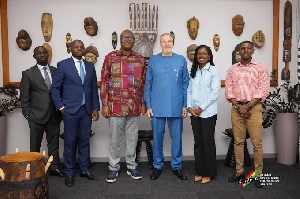- Home - News
- Elections 2024
- News Archive
- Crime & Punishment
- Politics
- Regional
- Editorial
- Health
- Ghanaians Abroad
- Tabloid
- Africa
- Religion
- Photo Archives
- Press Release
Health News of Tuesday, 22 April 2025
Source: www.ghanawebbers.com
Policy reforms required to bridge deaf health knowledge gaps - Study
A study has revealed significant gaps in sexual and reproductive health knowledge among deaf people in Ghana. This has led to urgent calls for policy reforms to improve access to health information and services.
The Ghana National Association of the Deaf (GNAD) conducted the research in October 2024. They received funding from Amplify Change to analyze these gaps. The findings were shared by Prof. Wisdom Kwadwo Morah at a national advocacy forum in Accra.
The study focused on the Northern, Upper East, Upper West, and Eastern regions. It assessed challenges faced by the deaf community in accessing quality health services. The results showed widespread knowledge deficiencies that require immediate action from stakeholders.
Prof. Mprah spoke with the Ghana News Agency about the research's goals. He emphasized that many deaf individuals lack adequate sexual health knowledge. Some have access to information but do not fully understand it.
He noted that the study targeted deaf individuals who use sign language and interpreters. However, many deaf people do not use interpreters, facing even greater challenges accessing information. “If those who can read or use interpreters struggle, those who cannot face bigger barriers,” he said.
Prof. Mprah called for targeted interventions for better access to social and financial services for deaf individuals. He also urged inclusion of deaf-blind persons in sexual health outreach programs.
Regarding family members as interpreters in medical settings, he stated it is ethically questionable. Family members may not be proficient in sign language and could compromise privacy or emotional well-being.
He recommended tailoring communication strategies to individual preferences. “Communication does not always mean using an interpreter,” he explained. Some may prefer written communication or lip-reading instead.
Prof. Mprah advocated for enhanced training programs for sign language interpreters to improve service delivery for Ghana’s deaf community.
Mr. Juventus Duorinaah, GNAD Executive Director, highlighted common barriers faced by deaf people in healthcare settings. Communication challenges with healthcare professionals often lead to miscommunication and stress.
He pointed out that long waiting times can delay care since deaf individuals may miss their names being called out loud. Low literacy levels also create difficulties with written communication between patients and doctors.
Mr. Duorinaah called for inclusive policies within the healthcare system so all persons with disabilities receive quality treatment. “Healthcare isn’t just about visiting hospitals; it should be a broader public health initiative,” he stated.
Ms. Grace Otoo, a nurse at Tema West Municipal Health Directorate, emphasized the importance of including sign language training in health facilities' staff development programs.
She suggested that GNAD engage more with leaders of the Ghana Health Service beyond forums to promote sign language at all levels of healthcare.
The forum urged policymakers and healthcare providers to prioritize accessibility improvements for deaf individuals in Ghana's healthcare system.
Recommendations included incorporating sign language into public events and news broadcasts, along with developing social media messages in sign language.
Adoption of video consultation technology was also suggested as a way forward alongside coordinated decisions and policies aimed at improving accessibility.
Entertainment










